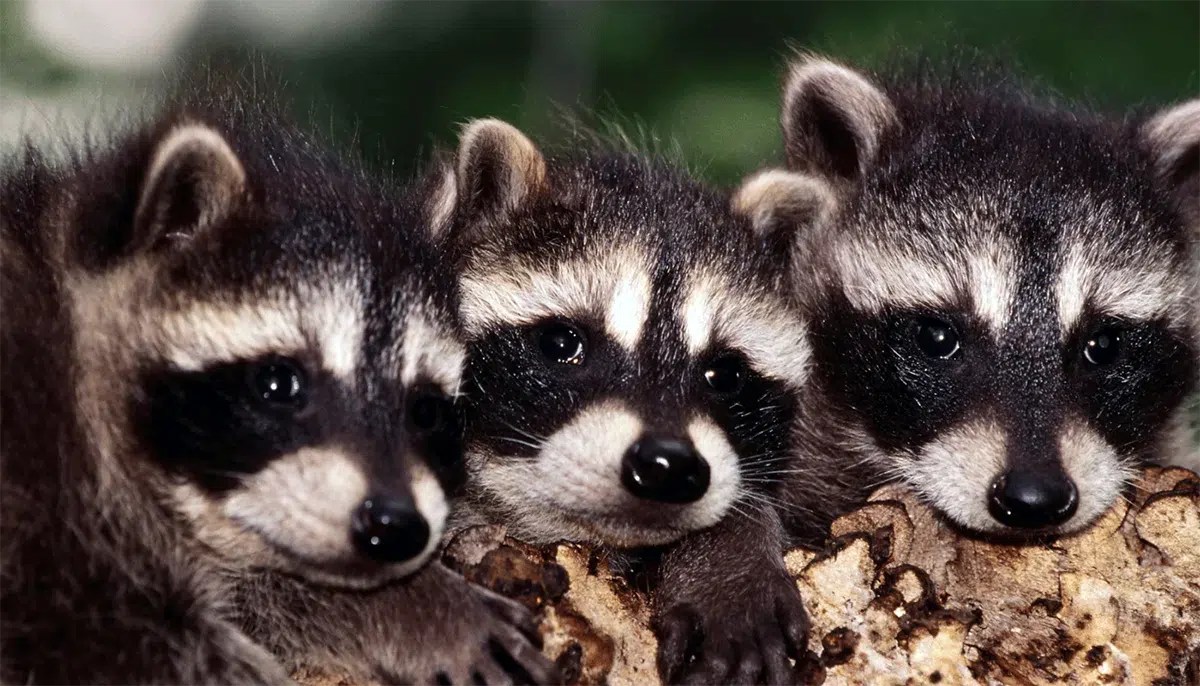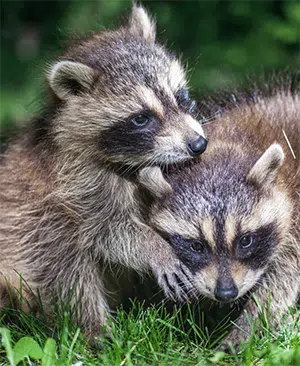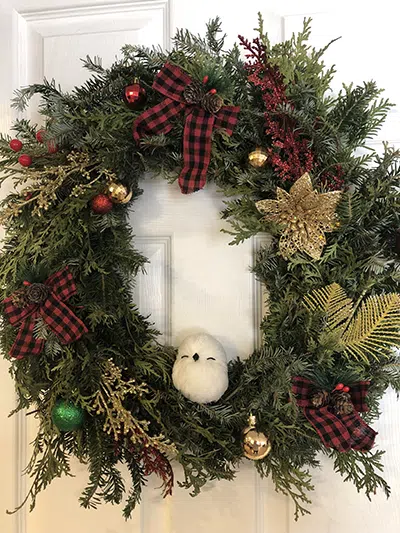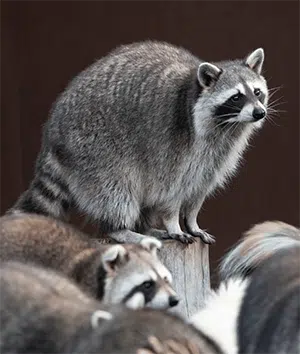You might wonder why raccoon breeding season is a topic in the midst of December? Well, now would be a really good time to double check around your home and ensure that no raccoons (or squirrels) can get in. Because they ARE thinking about breeding season and they WILL find a cozy spot to den and raise their offspring. And, that cozy spot will hopefully not be your attic!

Mating Behavior During Raccoon Breeding Season
Raccoon Mating Seasons in Toronto
Raccoon mating or breeding typically occurs in the later part of winter - January and after - with females giving birth in the Spring time to the only litter per year. However, if the first litter doesn't survive or is not viable, the female may mate again and have a successful litter later in the summer. 'When is raccoon breeding season' often depends on the amount of daylight and temperatures. But let's look at the raccoon breeding cycle a bit more closely:
Raccoon Mating Habits & Courtship Rituals
Raccoon mating habits are not unlike those of many other mammals - including humans :) The males posture and compete for the right to mate - this may go as far as a physical fight. And, the females will observe the spectacle and choose their mate, usually the strongest male. Dominant, healthy males may breed several females. The actual mating involves an hour or so of foreplay and finally copulation and may be repeated for several days. You know.. just to be sure :)
Raccoon Gestation and Birth
Once the female has mated and is indeed pregnant, she will become solitaryand set out in search of a den to raise her offspring. A lone raccoon foraging and lingering around your home in late January or early February may very well be a pregnant female looking for a den.
Gestation Period Details
Expectant mums have a 63 day (or, roughtly two months) gestation period before welcoming their litter into the world.
Typical Litter Size
 Female raccoons will give birth to an average litter of 4 kits - although, litters can range from 1 to 7 little ones. Babies are born blind and deaf, weighing only about 4 to 5 ounces. They are completely dependent on their mother's care for their first 3 weeks of life. As many as 50% of raccoon babies may not survive their first year of life. If separated from their mother early one, their chances are nil.
Female raccoons will give birth to an average litter of 4 kits - although, litters can range from 1 to 7 little ones. Babies are born blind and deaf, weighing only about 4 to 5 ounces. They are completely dependent on their mother's care for their first 3 weeks of life. As many as 50% of raccoon babies may not survive their first year of life. If separated from their mother early one, their chances are nil.
Signs of Raccoon Breeding Activity in Toronto
Increased Nighttime Activity
During the time of courtship and mating, you are more likely to see groups of raccoons. While raccoons are primarily nocturnal animals, they will be more visible and more social and interactive with each other duing this time.
Raccoon Vocalizations During Mating Season
Raccoons are very vocal animals at all times, chitter chattering and conversing with each other - but even more so during mating season. You might hear a male raccoon letting out loud, screeching calls to get the attention of a fancied female raccoon, which may be answered by a softer, chirping sound coming from said female. These calls play a crucial role in their mating rituals and territorial behaviors.
Scent Marking during Raccoon Breeding Season
Raccoons don't pee on trees, or distribute their excrement willy-nilly. In fact, raccoons are very clean animals, using designated latrine areas - and this doesn't change just because it's mating season. Instead, they will use their entire body to rub their scent on trees or structures and thus let others know who the master of this particular domain is.
Nesting Behavior
A pregnant female with separate from any social group she may have been part of and head out on her own to find or make her perfect nest or den. The requirements are fairly simple: a den fit to raise babies needs to be reasonably close to food and water, it ought to be safely tucked away and inaccessible to predators, and it should be dark and quiet. In the wild, this den is often a repurposed burrough abandoned by another animal; in urban settings, the perfect den often happens to be under or in human dwellings.
Impact of Breeding on Urban Raccoon Populations
Population Growth Trends
Toronto has earned its nickname 'Raccoon Capital of the World' for good reason. With ample food supply and no shortage of dwellings, raccoon breeding season will soon be in full swing and the raccoon population will continue to increase. Add to that the loss of habitat caused by ever expanding suburban housing development around Toronto, this trend is likely to continue. In fact, raccoon populations in Mississauga and Brampton have seen the same steady increase as well.
Community Challenges
Raccoons are highly intelligent and adaptable to boot. Studies have shown that they are able to learn by observation. So, the next time you secure your 'raccoon proof' lid on your trash bin, have a look over your shoulder and make sure you don't have a smart and nosey critter watching you.
Public Health Concerns
Urban raccoon populations generally have higher density rates and more potential for human encounters. This raises concerns for both human and domestic animal health, since raccoons serve as reservoirs of a number of zoonotic diseases including rabies and larval migrans disease, caused by the gastrointestinal nematode 'Baylisascaris procyonis'. In addition to carrying these human diseases, raccoons are host to a great spectrum of parasites, including over twenty nematode species and several species of gastrointestinal coccidia.
Preventative Measures for Homeowners in Toronto
Check out what the City of Toronto has published on raccoons here »
Remove Food Sources
The number one thing that attracts raccoons to your neighbourhood is the availability of food. Heck, there's hardly any foraging needed with food left out day and night and ready for the taking. So - let's move our pet food and water dishes inside and store animal feed in a locked shed or other impenitrable structure.
Secure Garbage and Compost
Your household garbage, your garden, and your compost are all food. To a raccoon, that is. And, to a host of other urban dwellers as well. If at all possible, store your trash bins indoors and secure your compost bin as best as you can. Remember that raccoons are not only smart, but also highly skilled at opening things.
Maintain Property
To avoid hosting a raccoon family, inspect your home regularly. Pay close attention to the roof, soffets, your chimney and vents as well as cut down branches that give access to your roof. Close up any openings you discover before winter - the last thing you'll want to do is trap a mother raccoon and/or her babies inside.
Educate the Community
Share your experiences with raccoons, your efforts to keep them at bay, what worked and what didn't with your neighbours. To secure a community from a raccoon invasion is a group effort.
When Raccoon Breeding Cycles Affect Your Home, Hawkeye Can Help
If you find that one or more raccoons have made it into your home, attic, or chimney, it may be time to call in a Professional Raccoon Removal Specialist. Especially, if you suspect that you may be dealing with a pregnant or nursing female, please do not make any attempts to trap the animal. Call Hawkeye Bird & Animal Control and let us assess the situation and offer Toronto Raccoon Removal solutions accordingly.
Related Articles: https://www.hawkeye.ca/blog/increasing-raccoon-threats-in-mississauga | https://www.hawkeye.ca/blog/raccoons-in-backyard | https://www.hawkeye.ca/blog/how-to-get-rid-of-the-dangers-of-raccoon-litters















